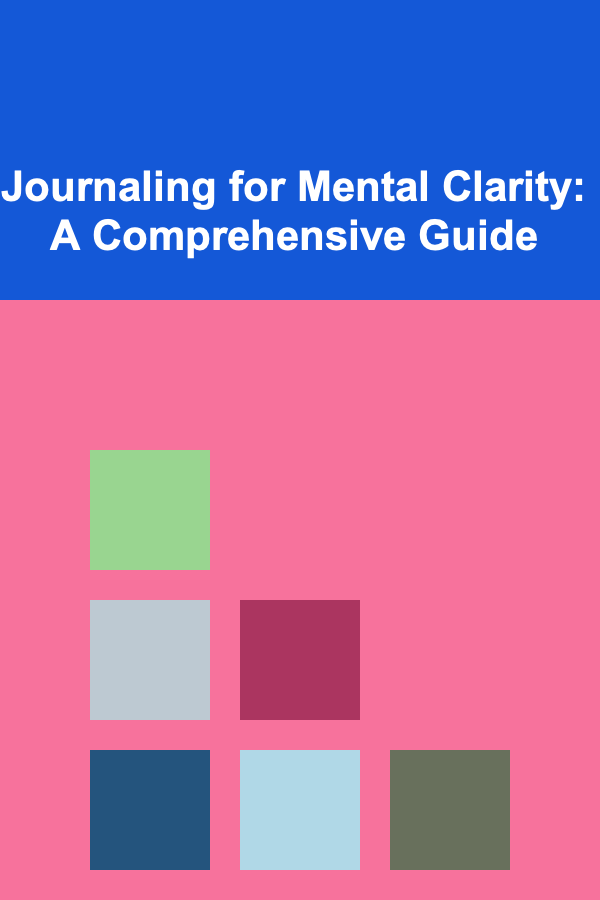
Journaling for Mental Clarity: A Comprehensive Guide
ebook include PDF & Audio bundle (Micro Guide)
$12.99$7.99
Limited Time Offer! Order within the next:

In today's fast-paced and often overwhelming world, mental clarity can feel like a distant dream. We are bombarded with information, demands, and distractions, leaving us feeling scattered, anxious, and unable to focus. Fortunately, there's a simple yet powerful tool that can help us navigate the chaos and cultivate a sense of calm and clarity: journaling.
This guide delves into the art and science of journaling for mental clarity. We'll explore why it works, different techniques to try, how to overcome common obstacles, and ultimately, how to integrate journaling into your daily life for lasting benefits.
Understanding Mental Clarity and Its Importance
Mental clarity refers to a state of clear thinking, focus, and awareness. It involves being able to process information effectively, make sound judgments, and maintain a sense of inner calm amidst external pressures. When we have mental clarity, we are better equipped to:
- Manage stress and anxiety: Clear thinking allows us to identify and address the root causes of our stress, rather than getting overwhelmed by the symptoms.
- Make better decisions: A clear mind can weigh options objectively and make choices aligned with our values and goals.
- Improve focus and concentration: Clarity reduces mental clutter and distractions, enabling us to concentrate on the task at hand.
- Enhance problem-solving abilities: When our minds are clear, we can approach problems with creativity and resourcefulness.
- Boost creativity and innovation: A calm and focused mind is more receptive to new ideas and insights.
- Improve overall well-being: Mental clarity contributes to a greater sense of peace, contentment, and self-awareness.
The absence of mental clarity can manifest in various ways, including:
- Brain fog: Feeling mentally sluggish, confused, and unable to think clearly.
- Difficulty concentrating: Struggling to focus on tasks or conversations.
- Anxiety and worry: Constant racing thoughts and a sense of unease.
- Procrastination: Avoiding tasks due to feeling overwhelmed or unmotivated.
- Poor decision-making: Making impulsive or irrational choices.
- Feeling overwhelmed: Being unable to cope with daily demands and responsibilities.
The Power of Journaling for Mental Clarity: Why It Works
Journaling is more than just writing down your thoughts and feelings; it's a powerful tool for self-reflection, emotional processing, and cognitive organization. Here's how it contributes to mental clarity:
- Externalizing Thoughts and Emotions: Journaling provides a safe space to externalize your thoughts and emotions, taking them out of your head and putting them on paper. This process can help you gain perspective and detach from overwhelming feelings. Consider it like dumping a cluttered room. You can't organize if everything is in piles on the floor. Journaling lets you "dump" the contents of your mind so you can see what you are working with.
- Identifying Patterns and Triggers: By regularly reflecting on your experiences in a journal, you can identify recurring patterns in your thoughts, emotions, and behaviors. This awareness can help you understand the triggers that contribute to stress, anxiety, and lack of clarity.
- Processing Trauma and Difficult Experiences: Journaling can be a therapeutic outlet for processing trauma and difficult experiences. Writing about painful events can help you make sense of them, release pent-up emotions, and begin the healing process. It is, however, important to note that journaling should not be a replacement for professional therapy, especially in cases of severe trauma.
- Organizing Thoughts and Ideas: Journaling can help you structure your thoughts and ideas, making them more coherent and manageable. This is especially helpful when you're feeling overwhelmed or confused. Think of it as mind mapping. You can start with a central idea and branch out, exploring the connections and relationships between different concepts.
- Practicing Mindfulness and Self-Awareness: The act of journaling encourages you to pay attention to your thoughts and feelings in the present moment. This practice of mindfulness can enhance self-awareness and help you become more attuned to your inner world.
- Boosting Cognitive Function: Studies have shown that journaling can improve cognitive function, including memory, attention, and processing speed. The act of writing stimulates the brain and helps to strengthen neural connections.
- Reducing Stress and Anxiety: Journaling has been shown to reduce stress hormones like cortisol and lower anxiety levels. By processing emotions and identifying stressors, journaling can help you cultivate a sense of calm and control.
- Promoting Self-Reflection and Growth: Journaling provides an opportunity for self-reflection, allowing you to examine your beliefs, values, and goals. This process can lead to greater self-understanding and personal growth.
Journaling Techniques for Mental Clarity: Finding What Works for You
There's no one-size-fits-all approach to journaling. Experiment with different techniques to find what resonates with you and best serves your needs. Here are several popular and effective methods:
1. Free Writing
Free writing is a stream-of-consciousness technique where you write continuously for a set period of time (e.g., 10-20 minutes) without worrying about grammar, spelling, or coherence. The goal is to simply let your thoughts flow onto the page without censorship or judgment.
How to practice free writing:
- Set a timer for a specific duration.
- Start writing and don't stop until the timer goes off, even if you feel like you have nothing to say. If you get stuck, write "I don't know what to write" repeatedly until something else comes to mind.
- Don't worry about grammar, spelling, or sentence structure.
- Don't judge or censor your thoughts.
- Focus on writing whatever comes to mind, without any agenda.
Benefits of free writing:
- Uncovering hidden thoughts and emotions
- Releasing mental clutter
- Generating new ideas
- Overcoming writer's block
2. Gratitude Journaling
Gratitude journaling involves focusing on the positive aspects of your life and expressing appreciation for the things you're grateful for. This practice can shift your focus from negativity to positivity, improving your mood and overall well-being.
How to practice gratitude journaling:
- Choose a time to journal each day (e.g., morning or evening).
- List 3-5 things you're grateful for. These can be big or small, tangible or intangible.
- Reflect on why you're grateful for each item.
- Try to be specific and detailed in your entries. Instead of writing "I'm grateful for my family," write "I'm grateful for my family because they always support me and make me laugh."
Benefits of gratitude journaling:
- Boosting happiness and optimism
- Reducing stress and anxiety
- Improving sleep quality
- Strengthening relationships
3. Prompt-Based Journaling
Prompt-based journaling involves using specific questions or prompts to guide your writing. This can be helpful when you're feeling stuck or unsure of what to write about. Prompts can focus on various aspects of your life, such as your goals, values, relationships, or emotions.
Examples of journaling prompts for mental clarity:
- What are you most worried about right now? Why? What steps can you take to address these worries?
- What are your core values? Are you living in alignment with them? If not, what changes can you make?
- What are your biggest strengths? How can you use them to overcome challenges?
- What are you grateful for today?
- What is one thing you can do today to improve your mental well-being?
- Describe a time when you overcame a difficult challenge. What did you learn from that experience?
- What are your goals for the next month, year, or five years? What steps do you need to take to achieve them?
- How are you feeling right now? Why do you think you're feeling that way?
- What are you avoiding? Why are you avoiding it? What would it take to tackle it?
- If you could give your younger self one piece of advice, what would it be?
Benefits of prompt-based journaling:
- Providing structure and guidance
- Facilitating self-reflection
- Exploring specific topics in depth
- Overcoming writer's block
4. Morning Pages
Morning pages, popularized by Julia Cameron in her book "The Artist's Way," involve writing three pages of stream-of-consciousness thoughts first thing in the morning. The purpose is to clear your mind and prepare yourself for the day ahead.
How to practice morning pages:
- Wake up and immediately start writing three pages in a notebook.
- Write whatever comes to mind, without censoring or judging your thoughts.
- Don't worry about grammar, spelling, or sentence structure.
- Don't reread your morning pages. The point is to dump your thoughts, not to analyze them.
Benefits of morning pages:
- Clearing mental clutter
- Boosting creativity
- Increasing self-awareness
- Reducing anxiety
5. Bullet Journaling
Bullet journaling is a highly customizable system that combines elements of a planner, diary, and to-do list. It's a flexible and effective way to organize your thoughts, track your progress, and achieve your goals.
Key components of a bullet journal:
- Index: A table of contents that helps you locate specific entries.
- Future Log: A yearly overview of upcoming events and deadlines.
- Monthly Log: A monthly calendar and task list.
- Daily Log: A daily record of tasks, events, and notes.
- Collections: Custom pages for tracking goals, ideas, or other information.
Benefits of bullet journaling:
- Improving organization and productivity
- Tracking progress towards goals
- Enhancing mindfulness and self-awareness
- Promoting creativity and self-expression
6. Dream Journaling
Dream journaling involves recording your dreams as soon as you wake up. This practice can help you understand your subconscious mind, identify recurring themes and symbols, and gain insights into your waking life.
How to practice dream journaling:
- Keep a notebook and pen by your bedside.
- As soon as you wake up, write down everything you remember about your dream, even if it seems fragmented or nonsensical.
- Include as much detail as possible, such as the people, places, and emotions involved in the dream.
- Look for recurring themes or symbols in your dreams.
- Reflect on how your dreams might relate to your waking life.
Benefits of dream journaling:
- Improving dream recall
- Understanding your subconscious mind
- Gaining insights into your emotions and behaviors
- Boosting creativity
7. Art Journaling
Art journaling combines writing with visual art forms, such as drawing, painting, collage, and mixed media. This technique can be a powerful way to express your emotions and explore your creativity.
How to practice art journaling:
- Gather your art supplies, such as a journal, pens, pencils, paints, collage materials, and any other materials you enjoy working with.
- Start by writing about your thoughts and feelings, or choose a specific prompt.
- Then, use your art supplies to express your emotions and ideas visually.
- Don't worry about creating perfect artwork. The focus is on self-expression and exploration.
Benefits of art journaling:
- Expressing emotions in a non-verbal way
- Boosting creativity
- Reducing stress and anxiety
- Enhancing self-awareness
Overcoming Common Obstacles to Journaling
Even with the best intentions, it can be challenging to establish a consistent journaling practice. Here are some common obstacles and strategies for overcoming them:
- Lack of Time: Integrate short journaling sessions into your existing routine. Even 5-10 minutes a day can make a difference. Try journaling during your commute, lunch break, or before bed.
- Feeling Uninspired: Use journaling prompts to spark your creativity. Explore different journaling techniques to find what resonates with you. Read inspiring books or articles to stimulate your thoughts.
- Fear of Judgment: Remember that your journal is a private space for your thoughts and feelings. There's no need to censor yourself or worry about what others might think.
- Perfectionism: Don't strive for perfect writing. Focus on expressing your thoughts and feelings honestly, without worrying about grammar, spelling, or sentence structure.
- Feeling Overwhelmed: Start small and gradually increase the amount of time you spend journaling. Focus on one specific area of your life or one specific emotion.
- Forgetting to Journal: Set a reminder on your phone or calendar. Keep your journal in a visible location as a reminder. Associate journaling with another habit, such as drinking your morning coffee.
Tips for Establishing a Consistent Journaling Practice
Consistency is key to reaping the benefits of journaling for mental clarity. Here are some tips for establishing a sustainable journaling practice:
- Choose a Time and Place: Designate a specific time and place for journaling each day. This will help you create a routine and make journaling a habit.
- Keep it Convenient: Keep your journal and pen easily accessible. The less effort it takes to start journaling, the more likely you are to do it.
- Start Small: Don't try to do too much too soon. Start with short journaling sessions and gradually increase the duration as you become more comfortable.
- Be Patient: It takes time to develop a journaling habit. Don't get discouraged if you miss a few days. Just pick up where you left off.
- Be Flexible: Adjust your journaling routine as needed. If you find that a particular technique isn't working for you, try something else.
- Be Kind to Yourself: Don't judge yourself for your thoughts and feelings. Your journal is a safe space for self-exploration and self-acceptance.
- Review Your Entries: Periodically review your journal entries to identify patterns, track your progress, and gain insights into your life.
- Experiment with Different Mediums: Try different types of journals, pens, or digital tools to find what you enjoy using. This could include using a physical notebook, a word processor, or a dedicated journaling app.
- Join a Journaling Community: Connect with other journalers online or in person. Sharing your experiences and getting support from others can help you stay motivated.
Beyond the Pen: Integrating Journaling with Other Mental Wellness Practices
Journaling is a powerful tool on its own, but its benefits can be amplified when combined with other mental wellness practices. Consider incorporating these practices into your routine:
- Meditation: Meditation can help you cultivate mindfulness and reduce stress, making it a perfect complement to journaling. Meditate before or after journaling to deepen your self-awareness.
- Yoga: Yoga combines physical postures, breathing exercises, and meditation to promote relaxation and reduce stress. Yoga can help you connect with your body and release emotional tension, making it easier to express yourself in your journal.
- Mindfulness: Mindfulness involves paying attention to the present moment without judgment. Practice mindfulness throughout the day to enhance your self-awareness and improve your journaling experience.
- Exercise: Regular exercise has been shown to improve mood, reduce stress, and boost cognitive function. Exercise can help clear your mind and make you feel more energized for journaling.
- Spending Time in Nature: Spending time in nature has been shown to reduce stress, improve mood, and enhance creativity. Take your journal outside and write about your experiences in nature.
- Connecting with Loved Ones: Social connection is essential for mental well-being. Spending time with loved ones can provide support, reduce stress, and improve your overall mood, making it easier to focus on your journaling practice.
- Healthy Diet: A healthy diet can improve cognitive function, boost mood, and reduce stress. Nourish your body with wholesome foods to support your mental clarity.
Conclusion: Embracing Journaling for a Clearer Mind
Journaling is a versatile and accessible tool that can significantly enhance mental clarity, reduce stress, and promote overall well-being. By experimenting with different techniques, overcoming common obstacles, and integrating journaling with other mental wellness practices, you can unlock its full potential and create a life of greater focus, peace, and purpose.
Start today. Pick up a pen and a notebook, or open a digital document, and begin your journey towards a clearer, more focused, and more fulfilling life through the power of journaling. The act of simply putting pen to paper (or fingers to keyboard) can be profoundly transformative. Give yourself the gift of mental clarity -- one journal entry at a time.

How to Utilize Wall Space for Additional Storage
Read More
How To Master Companion Planting
Read More
How to Make Your Own Healthy Baked Goods
Read More
How to Explore the Roots of Blues Music
Read More
How To Develop Early Social Skills for Group Play
Read More
10 Tips for Solving Mechanical Puzzles: A Hands-On Guide
Read MoreOther Products

How to Utilize Wall Space for Additional Storage
Read More
How To Master Companion Planting
Read More
How to Make Your Own Healthy Baked Goods
Read More
How to Explore the Roots of Blues Music
Read More
How To Develop Early Social Skills for Group Play
Read More